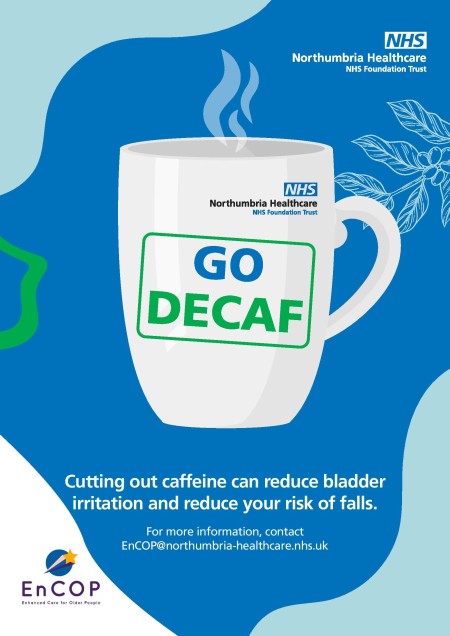Publish date: 1 May 2024
Go decaf! How a simple change on our wards could reduce falls, slips and trips
Across our hospitals in Northumberland and North Tyneside,
However, there is agreement from a wide range of different specialists in the trust that there could be a range of benefits to making decaf drinks the norm. A key one is a potential reduction in patients falling as they try to go to the toilet.
Therefore, we are running a pilot this month (May 2024) to discover the impact on reduced falls, and patient and staff experience.
What are we doing?
The pilot will look particularly to target those patients at risk of incontinence and falls. The evidence shows a clear link between incontinence and falls at night. Recent data reveals that more than a quarter of slips, trips and falls in our hospitals were due to toileting, especially at night.
It will take place in wards at the Northumbria Specialist Emergency Care Hospital in Cramlington, Wansbeck and Hexham General Hospitals, Blyth Community Hospital, plus a care home.
Hot drinks with caffeine can still be provided on request, but staff will explain to patients the benefits of switching to decaf. Ward and care home staff will be supported by clinical educators from our EnCOP (Enhanced Care for Older People) team.
The EnCOP team is the major driving force behind this decaf project, but it involves a lot of cross-team working. The principles of switching to decaffeinated drinks are backed by teams ranging from falls, continence and nutrition to pharmacy, oral health, and infection prevention and control.
Why?
Caffeine is a natural chemical with stimulant effects, which means it increases activity in your brain and nervous system. It is found in tea and coffee as well as many other products.
Decaf tea or coffee is simply where the caffeine has been removed from the coffee beans or tea leaves. It may still contain very low levels depending on how it was produced.
Having an overactive bladder means that people may experience urgency, frequent need to go, and waking during the night to pass urine. Caffeine can make this worse as it can irritate the bladder.
By reducing that sudden urge to pass urine, it helps reduce the risk of a patient having a fall which can often happen when rushing to reach the toilet in time.
Other benefits of switching to decaffeinated tea or coffee include:
- Improved sleep
- Reducing noticeable / irregular heartbeats (palpitations)
- Helping prevent dehydration and headaches
- Reducing indigestion
- Reduced risk of a condition that weakens bones (osteoporosis), as caffeine prevents absorption of calcium
The inspiration
Given these benefits, it may seem like an oversight that we have not previously switched to decaf drinks. However, we are among the first NHS trusts to look at this.
The trailblazers were University Hospitals of Leicester NHS Trust, which launched its Taste the Difference Challenge in 2021. Developed by the trust’s adult continence team, it involves offering decaf tea and coffee to patients, educating them about the benefits, particularly in relation to a healthier bladder, and asking for feedback as to whether they can taste the difference.
During the challenge, the team collated nearly 700 pieces of patient feedback. More than half of patients said they couldn’t taste the difference, and more than three-quarters said they would switch to decaf once they knew the health benefits.
Leicester's hospitals now serve decaffeinated tea and coffee as default, with caffeinated tea or coffee served if requested.
For more information, contact EnCOP
Clare Collins, EnCOP clinical educator
Isobel Constable, continence team lead
Related stories
